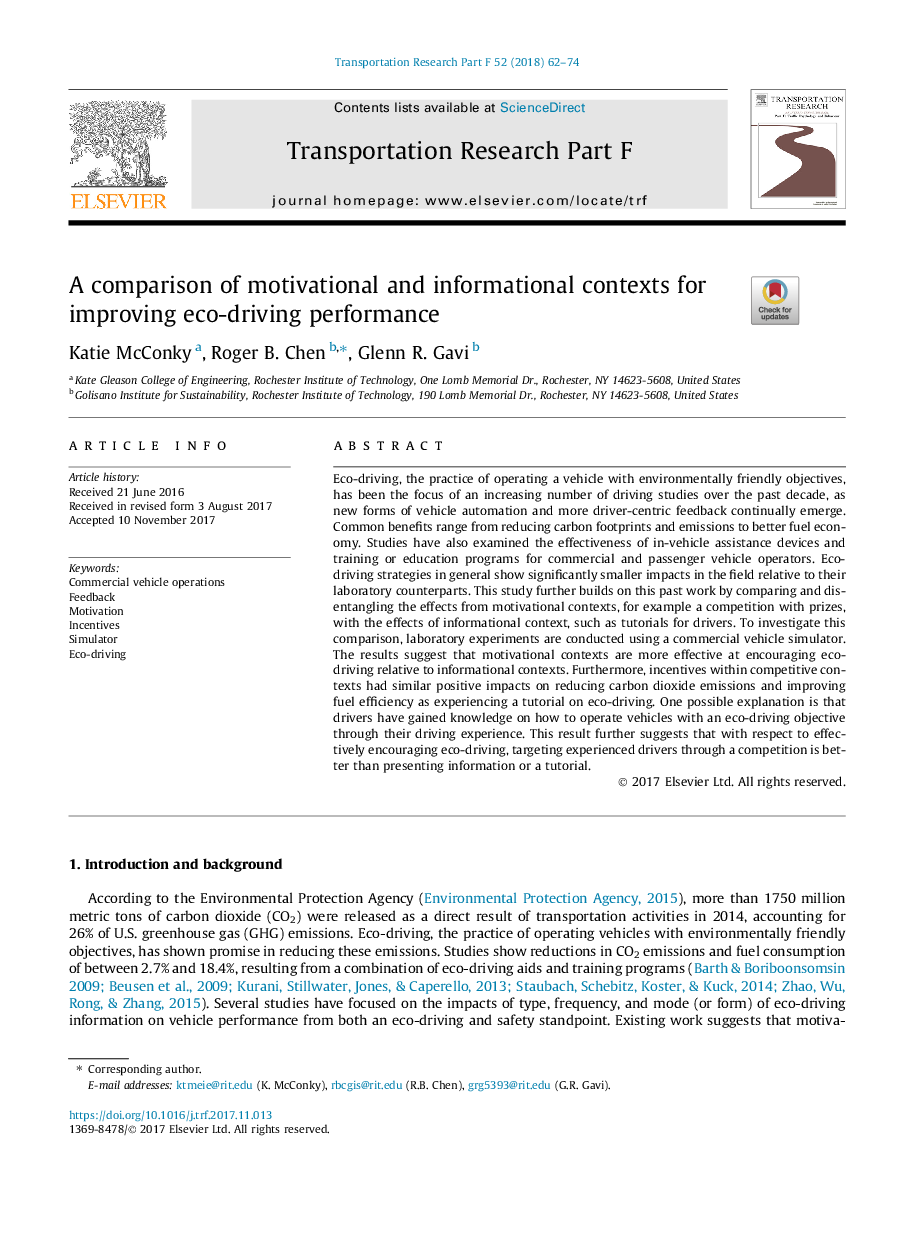| کد مقاله | کد نشریه | سال انتشار | مقاله انگلیسی | نسخه تمام متن |
|---|---|---|---|---|
| 7258044 | 1472434 | 2018 | 13 صفحه PDF | دانلود رایگان |
عنوان انگلیسی مقاله ISI
A comparison of motivational and informational contexts for improving eco-driving performance
ترجمه فارسی عنوان
مقایسه مقیاس های انگیزشی و اطلاعاتی برای بهبود عملکرد رانندگی در محیط زیست
دانلود مقاله + سفارش ترجمه
دانلود مقاله ISI انگلیسی
رایگان برای ایرانیان
کلمات کلیدی
عملیات تجاری خودرو، بازخورد، انگیزه، انگیزه، شبیه ساز رانندگی با محیط زیست،
ترجمه چکیده
رانندگی با محیط زیست، تمرین کارکرد وسیله نقلیه با اهداف سازگار با محیط زیست، تمرکز تعداد زیادی از مطالعات رانندگی در دهه گذشته بوده است، زیرا شکل های جدید خودروسازی و بازخورد بیشتر راننده محور به طور مداوم ظاهر می شوند. مزایای مشترک از کاهش ضایعات کربن و انتشار گازهای گلخانه ای تا اقتصاد سوخت بهتر است. مطالعات همچنین اثربخشی وسایل کمک در وسایل نقلیه و برنامه های آموزشی یا آموزش برای اپراتورهای تجاری و وسایل نقلیه مسافری را مورد بررسی قرار داده است. استراتژی های رانندگی زیست محیطی به طور کلی اثرات مؤثرتری در زمینه در مقایسه با همتایان آزمایشگاهی آنها نشان می دهد. این مطالعه بیشتر بر روی این کار گذشته با مقایسه و رها کردن اثرات زمینه های انگیزشی، به عنوان مثال رقابت با جوایز، با اثرات زمینه های اطلاعاتی، مانند آموزش برای رانندگان، بر این کار افزوده می شود. برای بررسی این مقایسه، آزمایشات آزمایشگاهی با استفاده از یک شبیه ساز خودرو تجاری انجام می شود. نتایج نشان می دهد که زمینه های انگیزشی در تشویق زیست محیطی نسبت به زمینه های اطلاعاتی موثرتر است. علاوه بر این، انگیزه ها در شرایط رقابتی اثرات مشابه مثبت بر کاهش انتشار دی اکسید کربن و بهبود بهره وری سوخت را به عنوان تجربه آموزش در مورد رانندگی زیست محیطی. یک توضیح احتمالی این است که رانندگان دانش خود را در مورد چگونگی استفاده از وسایل نقلیه با اهداف زیست محیطی از طریق تجربه رانندگی خود بدست آورده اند. این نتیجه بیشتر نشان می دهد که با توجه به به طور موثر تشویق زیست محیطی رانندگی، هدف قرار دادن رانندگان با تجربه از طریق رقابت بهتر از ارائه اطلاعات و یا آموزش است.
موضوعات مرتبط
علوم انسانی و اجتماعی
روانشناسی
روان شناسی کاربردی
چکیده انگلیسی
Eco-driving, the practice of operating a vehicle with environmentally friendly objectives, has been the focus of an increasing number of driving studies over the past decade, as new forms of vehicle automation and more driver-centric feedback continually emerge. Common benefits range from reducing carbon footprints and emissions to better fuel economy. Studies have also examined the effectiveness of in-vehicle assistance devices and training or education programs for commercial and passenger vehicle operators. Eco-driving strategies in general show significantly smaller impacts in the field relative to their laboratory counterparts. This study further builds on this past work by comparing and disentangling the effects from motivational contexts, for example a competition with prizes, with the effects of informational context, such as tutorials for drivers. To investigate this comparison, laboratory experiments are conducted using a commercial vehicle simulator. The results suggest that motivational contexts are more effective at encouraging eco-driving relative to informational contexts. Furthermore, incentives within competitive contexts had similar positive impacts on reducing carbon dioxide emissions and improving fuel efficiency as experiencing a tutorial on eco-driving. One possible explanation is that drivers have gained knowledge on how to operate vehicles with an eco-driving objective through their driving experience. This result further suggests that with respect to effectively encouraging eco-driving, targeting experienced drivers through a competition is better than presenting information or a tutorial.
ناشر
Database: Elsevier - ScienceDirect (ساینس دایرکت)
Journal: Transportation Research Part F: Traffic Psychology and Behaviour - Volume 52, January 2018, Pages 62-74
Journal: Transportation Research Part F: Traffic Psychology and Behaviour - Volume 52, January 2018, Pages 62-74
نویسندگان
Katie McConky, Roger B. Chen, Glenn R. Gavi,
